In a series of moves that have rocked the political landscape, search operations have been launched targeting prominent members of the government in a corruption investigation. The investigation concerns allegations of influence peddling and corruption linked to contracts for greenhydrogen and lithium mining, key components for battery technologies and an essential pivot in the energy transition.
The office of the Socialist Prime Minister’s chief of staff was one of the focal points of the searches. Despite the seriousness of the investigation, the Head of Government’s press office has chosen not to comment on the ongoing actions of the judicial authorities, respecting the independence of the investigators. This official silence suggests an implicit recognition of the severity of the situation, while maintaining a cautious distance from legal proceedings.
Corruption Investigation and Energy Transition
The resonance of the affair reached the highest echelons of the state, with conservative President Marcelo Rebelo de Sousa having a swift but significant interaction with Prime Minister Antonio Costa. This brief meeting, though devoid of public details, indicates the potential magnitude of the affair on national governance.
The daily Publico reveals that the searches also involved the Ministry of the Environment and Infrastructure, highlighting the possible interconnection between the corruption allegations and the country’s environmental policies. This is a blow not only to the reputation of the current government, but also to Portugal’s commitment to sustainable development and clean energy.
Political repercussions of the affair
These unprecedented judicial initiatives mobilized some 140 police officers, reflecting the scope and complexity of the investigation. The Ministry of the Environment has confirmed these interventions while expressing ignorance of the precise reasons for the searches, a position that seems to reflect a certain tension and uncertainty within government ranks.
Implications for Public Trust and Governance
As the survey continues, attention is turning to the potential impact on public confidence in institutions. These raids raise critical questions about the integrity of civil servants and the vulnerability of government tendering processes to corruption, especially in sectors as vital as energy and infrastructure.






















